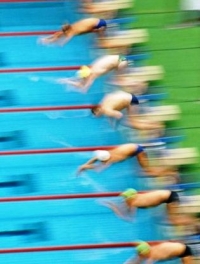In The News:

He Races Back After Modern Prostate Surgery
Bob Patten set a swimming world record 100 days after laparoscopic prostate surgery. You can also read in his words what happened after prostate removal by clicking here.
***
When Bob Patten of Littleton, Colo., was diagnosed with prostate cancer in March he was five months away from setting the 200-meter breaststroke world record for men ages 70-74. And the master swimmer was two months away from surgery at Aventura Hospital.
Swimming became his hobby at age 15 and, since 1983, his workouts included up to two miles in the pool five days a week and bike riding or weight lifting two days a week.
With good health overall, Patten, then 69, considered "watchful waiting" rather than surgery. The thought of surgery evoked memories of his wife dying on an operating table while having a leg removed because of diabetes 10 years ago. More, recently, his nephew had open prostate surgery and nearly died from complications of a blood transfusion.
Watchful waiting seemed like a good idea until "I was talking to this fellow and he said, ‘Oh, you want to meet a friend who watched and wait-ed?...We'll have to go to the cemetery.' "
That was all the motivation Patten needed to search for the best treatment. His options: Radioactive seeds, in which implants deliver radiation to the prostate; cryosurgery, a new technique that involves freezing the prostate to destroy it; radiation, which uses high-energy rays to kill cancer cells, although it can damage healthy cells; and surgical removal of the prostate.
Patten was leaning toward radioactive seeds, until he met a few men who had complications with seeds. Meanwhile, his son Rick was busy researching treatments when he came across Laparoscopic Radical Prostatectomy, which was not available in Colorado. This modern form of radical prostatectomy relies on puncture wounds instead of an abdominal incision. The patient has less pain and bleeding, and recovery time is reduced. With open radical prostatectomy, bleeding is typically heavy and transfusions are not uncommon.
One name that kept pop-ping up in LRP research was Dr. Arnon Krongrad, a surgeon in Aventura. Rick sent Krongrad an e-mail and soon found out that, like Patten, Krongrad was also a master swimmer. It turns out that Patten's other son, Bobby, was Krongrad's swim coach in Dallas during the late ‘80s.
After talking to his local physicians and Krongrad, Patten decided to have the surgery in Flor-ida, but his insurance company put up a fight.
"Their policy was clearly deny, duck and delay," Patten said. "They would not return phone calls, faxes, e-mails. It was amazing."
In the end, he opted out of insurance and Medicare paid a major portion of the procedure. Patten and Bobby flew to Miami, with Rick joining them later, and their meeting with Krongrad felt more like a swimmer's reunion than a doctor visit.
The night before surgery, they attended a workout at Florida International University. Though Patten swam slower than usual to ease pre-surgery jitters, it was clear to Krongrad that this patient "was a serious swimmer."
On the morning of May 5, Patten woke up in his hospital bed and asked, "When will the surgery start." A nurse told him the surgery was completed, and he was discharged the next morning, with no prescription pain killers. Later, he was told the cancer had been eliminated.
"Never having had any surgery, I thought there'd be a lot more pain, Patten said. Two weeks after surgery, he was back in the water.
"I didn't push it hard and it went much easier than expected," he said. "The only place there was a little bit of pain is when you stretch out, make yourself as long as you can in the water."
It didn't take him long to decide to compete at the U.S. Masters Swimming long-course national championships, held in Savannah, Ga., in August.
There, he emerged from the water at the end of the 200-meter breaststroke drenched
in victory. The loudspeakers blared that Patten, now 70, had set a world record in the 70-74 age group. In three minutes and 18.2 seconds he beat the old record by more than 1.5 seconds, 100 days after prostate surgery.
"I felt good...I was completely surprised," says Patten, whom Krongrad calls "the geriatric Lance Armstrong."
"There was a time when I wasn't sure when or if I'd be back in the water."
SMART BOX: PROSTATE CANCER
RISK FACTORS include age, race and family history. More than 70 percent of all prostate cancers are diagnosed in men over the age of 65, but Dr. Arnon Krongrad has seen patients diagnosed in their 30s. It occurs about 60 percent more often in African-American men, but all races are susceptible. Having a father or brother with prostate cancer more than doubles a man's risk of developing this disease.
EARLY PROSTATE
Cancer is usually asymptomatic, therefore regular doctor visits should include prostate-specific antigen (PSA) and digital rectal exams. Visit www.americancancersociety.org ,
www.prostate-online.com and www.krongrad-urology.com for more information.
Sources: American Cancer Society and Dr. Arnon Krongrad
download as pdf 
Notice: Undefined index: r in /home/eb4nhwo80k78/public_html/classes/site.php on line 321
Notice: Undefined variable: prev in /home/eb4nhwo80k78/public_html/classes/site.php on line 444
Notice: Undefined index: r in /home/eb4nhwo80k78/public_html/classes/site.php on line 321
Notice: Undefined variable: prev in /home/eb4nhwo80k78/public_html/classes/site.php on line 444


